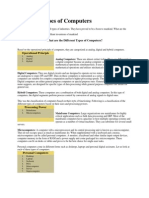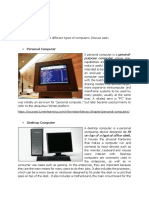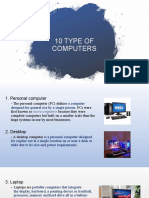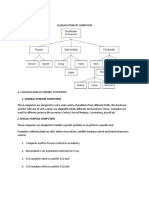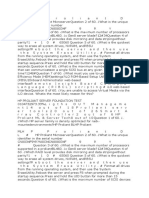0% found this document useful (0 votes)
27 views2 pagesSts Report
The document discusses the role of computers in modern life, defining them as electronic devices that manipulate information through binary code. It categorizes various types of computers, including personal computers, laptops, servers, and mainframes, highlighting their functions and applications in both personal and business contexts. Additionally, it contrasts servers and mainframes, noting their different capacities and purposes in data management and application hosting.
Uploaded by
Gift Joy RemadaCopyright
© © All Rights Reserved
We take content rights seriously. If you suspect this is your content, claim it here.
Available Formats
Download as DOCX, PDF, TXT or read online on Scribd
0% found this document useful (0 votes)
27 views2 pagesSts Report
The document discusses the role of computers in modern life, defining them as electronic devices that manipulate information through binary code. It categorizes various types of computers, including personal computers, laptops, servers, and mainframes, highlighting their functions and applications in both personal and business contexts. Additionally, it contrasts servers and mainframes, noting their different capacities and purposes in data management and application hosting.
Uploaded by
Gift Joy RemadaCopyright
© © All Rights Reserved
We take content rights seriously. If you suspect this is your content, claim it here.
Available Formats
Download as DOCX, PDF, TXT or read online on Scribd
/ 2







